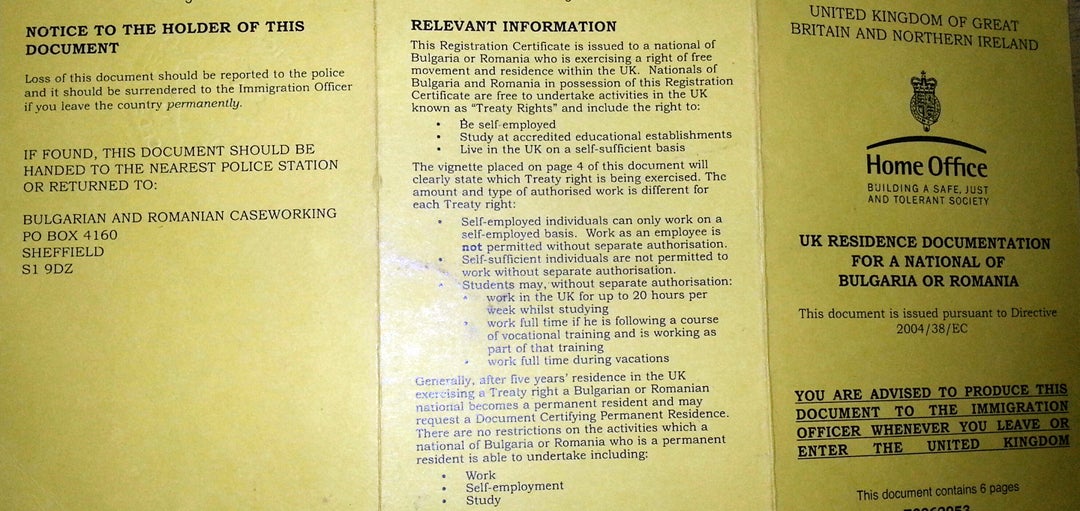Why is the UK biased against students from Romania and Bulgaria?
They might be members of the EU, but UK law discriminates unfairly against students from Romania and Bulgaria. Madalina Ciobanu, a Romanian student studying at UWE, doesn't like the system.

Your support helps us to tell the story
From reproductive rights to climate change to Big Tech, The Independent is on the ground when the story is developing. Whether it's investigating the financials of Elon Musk's pro-Trump PAC or producing our latest documentary, 'The A Word', which shines a light on the American women fighting for reproductive rights, we know how important it is to parse out the facts from the messaging.
At such a critical moment in US history, we need reporters on the ground. Your donation allows us to keep sending journalists to speak to both sides of the story.
The Independent is trusted by Americans across the entire political spectrum. And unlike many other quality news outlets, we choose not to lock Americans out of our reporting and analysis with paywalls. We believe quality journalism should be available to everyone, paid for by those who can afford it.
Your support makes all the difference.Romanian and Bulgarian students pursuing higher education in the United Kingdom face a tough choice: the country has extended their work restrictions until January 2014.
Yuliya Kosharevska, a first year Bulgarian student in Bristol is passionate about her studies, but she has one big concern. It’s not the workload, it’s the fact that she feels trapped as bureaucratic dithering prevents her from getting a job.
Romania and Bulgaria have been members of the European Union since 2007. Article 39 of the European Commission Treaty entitles EU citizens to ‘look for a job and work in a country without needing a work permit’. Nevertheless, EU countries are legally entitled to extend work restrictions on these two countries if they consider it economically appropriate, and apart from the UK (England more specifically, as Ireland has lifted these restrictions last year), Bulgarians and Romanians face such restrictions to some extent in other EU countries.
According to the UK Council for International Student Affairs (UKCISA), Romania and Bulgaria are among the top ten EU sending countries when it comes to higher education in the UK. With 4,625 and 4,615 students respectively in the 2010-2011 academic year, these numbers are likely to increase annually. But the situation is alarming as many of these students are counting on the possibility to obtain a job in order to fund their studies, which may last up to four years. According to Romania-Insider.com, in February 2012 the monthly average net salary gain in Romania was approximately EUR 340 (£275), with an average of EUR 360 (£292) for Bulgarians in the same month. Thus, it is almost imperious for students to be able to acquire a job within a maximum of three months of their arrival in the UK in order to fund an average budget of £400/month. Unfortunately, many have to abandon their dreams and return home.
The Registration Certificate, or ‘Yellow Card’ work permit allows students to work and take placements in England. They must apply for it by sending a completed 15-page form, proof of identity and address, bank statements, sponsorship evidence, a declaration that states they will not become a burden on the British state and the recently introduced comprehensive sickness insurance. The governmental body in charge of it is the UK Border Agency (UKBA Home Office), and according to their website, they ‘aim to decide 99 per cent of [postal] applications within six months of receipt’.
As this was indeed the case three years ago, as the number of applicants increases annually, so does the number of months students have to spend without this document. The current waiting times seem to have have extended to nine months in many cases, although it can vary. The process has become a lottery, with those lucky or persistent enough being able to book appointments in person at UKBA’s public enquiry office, where their work permit is released on the same day.
Yuliya, who is studying Journalism at UWE, says: ‘It is unfair that we don't get the same start as the rest of Europe. Obviously, we can't compete with Western European students, who receive considerable amounts of money from their parents and even their governments. We are not asking for England to hand their money over to us, we just want to have the right to work here because we want to educate ourselves.’ UKBA refused to comment on the matter.
The British government clearly has the right to impose rules and regulations as it sees fit to protect British citizens from an exceedingly big immigration wave from these Eastern European countries. Yet, Romanian and Bulgarian students perform well in the UK even in top universities such as Cambridge and Oxford and many argue that they should entirely benefit from their European national status.
Mădălina Ciobanu, is a 19-year-old Romanian journalism and public relations student at UWE Bristol. Read her blog here, and follow her on Twitter here.
Join our commenting forum
Join thought-provoking conversations, follow other Independent readers and see their replies
Comments